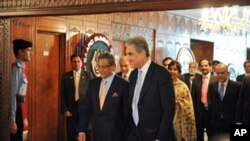As India's foreign minister, S.M. Krishna, prepared to open Thursday's talks with archrival Pakistan in Islamabad, he said he was bringing "a message of peace" to his Pakistani counterpart, Shah Memood Qureshi.
But earlier in the week, India directly accused Pakistan's intelligence agency of coordinating the 2008 Mumbai attacks. In the past, India has said the agency, the ISI, was linked to the attackers, but this week's allegations are the first to directly blame the Pakistani government.
Robert Bradnock, a senior visiting research fellow at King's College in London, recently published the first-ever public opinion survey of people living in both Indian and Pakistani Kashmir. Bradnock told VOA's Barry Newhouse that despite a long history of strained relations, both India and Pakistan seem to want to get back on solid ground.
Robert Bradnock: "The stakes are very high. For the Indian government, the resolution of those Mumbai attacks, the successful prosecution of the case, against those charged is still a really central priority. And it could still prove a huge stumbling block."
Barry Newhouse: "But if India is now saying that Pakistan's intelligence services directly coordinated the Mumbai attacks, and says they have new evidence to back up that claim, including the interrogation of David Headly, the Pakistani-American linked to the Pakistani militant group, Lashkar-e-Taiba, where does that leave them?"
Robert Bradnock: "It leaves it still in a very, very difficult position. There is no evidence yet that the Pakistan government is willing to concede that the ISI [Pakistan's intelligence agency] played any part in the Mumbai attacks. And the evidence of David Headly is going to be a very significant stumbling block. And basically, the Indian position is that, at the moment, the Pakistan government hasn't taken sufficient steps either against the Lashkar-e-Taiba or against those elements in the ISI who continue to support militant activity. And so there's going to be a really stressed path, if you like, back to a stable, serious discussion."
Barry Newhouse: "And on the Pakistani side, in Islamabad, there's still a great deal of suspicion about India's motives in Afghanistan as well as resolving the long-running Kashmir conflict, what do you see as the Pakistani interest in these talks?
Robert Bradnock: "Pakistan is deeply suspicious of India's interest in Afghanistan. Pakistan fears being surrounded, not just having India as a potential enemy or as an actual enemy, in Pakistan's eyes, on its eastern frontier. But [also India] manipulating the situation in Afghanistan against Pakistani interests. One of the things that has been most difficult for Pakistan to come to terms with is that India is now seen internationally as the major economic force in South Asia, as the major, the key political player in South Asia. That's been very difficult for Pakistan to come to terms with. And yet, there is a longterm security gain for Pakistan if it can stabilize relations with India.
Barry Newhouse: "You authored a recent survey on Kashmir, the only survey conducted from both sides of the Line of Control. What did you hear from the Kashmiris?"
Robert Bradnock: "The overwhelming majority of Kashmiris on both sides of the border say unemployment is the most important issue, along with a whole range of other economic issues. But having said that, nearly all Kashmiris do say that solving this crisis problem is very important to them personally. The thrust of Kashmiri opinon found in this report is that we need to be involved in a politically negotiated settlement. We can find that settlement, we can find it around looking at the Line of Control, modifiying the Line of Control, making it a soft border, but we need to be involved in all of those discusssions and in the politics. And that's still a big step for Pakistan and India to take."




